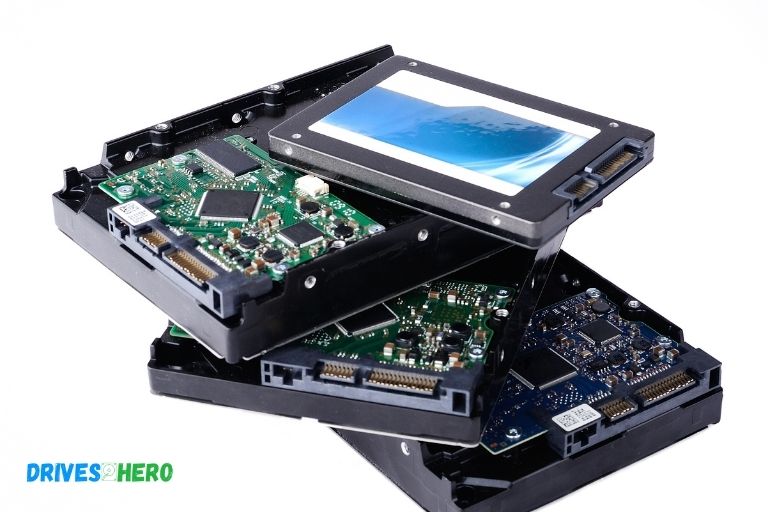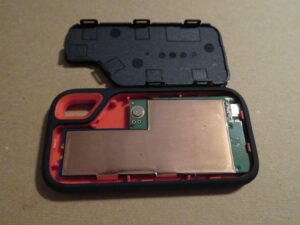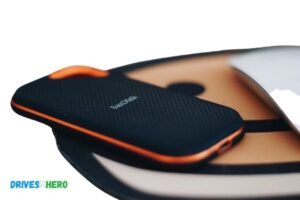Portable Ssd Vs Hdd : Lets Find The Best!
A portable SSD (Solid State Drive) is a type of storage device that uses non-volatile flash memory to store data.
It has faster read/write speeds than an HDD (Hard Disk Drive), which stores data using spinning disks and magnetic heads.

Portable SSDs offer faster speeds than HDDs, making them great for storing and accessing large files quickly.
They are also more reliable as they have no moving parts, making them a better option if you’re looking for long-term storage.
Additionally, portable SSDs tend to be smaller and lighter than HDDs which makes them easier to transport.
Here is a comparison table:
| Feature | Portable SSD | Portable HDD |
|---|---|---|
| Storage Capacity | Generally ranges from 256GB to 4TB | Generally ranges from 500GB to 5TB |
| Speed | Faster than HDD due to lack of moving parts; can transfer data at around 400MB/s to 1GB/s | Slower than SSD due to moving parts; can transfer data at around 100MB/s to 200MB/s |
| Durability | Resistant to shock, vibration, and extreme temperatures; less prone to physical damage | Prone to physical damage due to moving parts; may not withstand shock, vibration, and extreme temperatures |
| Power Consumption | Uses less power than HDD; requires no external power source | Uses more power than SSD; requires external power source for operation |
| Price | More expensive than HDD; generally ranges from 50to50 to 50to500 | Less expensive than SSD; generally ranges from 30to30 to 30to300 |
| Ideal Use | Ideal for professionals who require high-speed data transfer and demanding tasks such as photo and video editing | Ideal for general users who require large storage capacity for documents, music, and videos |
Is an External Ssd Better Than an External Hdd?
An external SSD is typically better than an external HDD for a number of reasons. An SSD has no moving parts and therefore can access data much faster than an HDD, providing superior performance when it comes to tasks such as loading software or transferring files.
Additionally, since there are no mechanical components in an SSD, they’re more reliable and have longer lifespans compared to HDDs.
Furthermore, external SSDs tend to be smaller in size and consume less power than HDDs so they’re ideal for use on the go.
Ultimately, if you need fast performance with minimal noise or vibration then an external SSD is the way to go; however, if your budget is tight then you may want to consider opting for a cheaper HDD instead.
Which is Better Portable Hard Disk Ssd Or Hdd?
When it comes to deciding between a portable hard disk SSD or HDD, the best option for most people is an SSD.
This is due to its superior speed, durability, and capacity in comparison to an HDD. An SSD can transfer data up to five times faster than an HDD and can also withstand more shock without failing.
Additionally, with their smaller form factor they are capable of storing significantly more data than an HDD while being much lighter and easier to transport around.
Ultimately, if you want fast read/write speeds along with excellent portability then a portable hard disk SSD would be your best choice over an HDD.
Is a Portable Ssd Better?
A portable SSD is generally better than a regular HDD, as they offer faster loading times, more reliable data storage, and are often lighter in weight.
Portable SSDs also use less power so they can be used for longer periods of time without draining your laptop’s battery.
Furthermore, since the data on an SSD is stored on non-moving parts, it is generally much more resistant to shock or vibration damage compared to HDDs which contain spinning platters.
Finally, many portable SSDs come with encryption technology built-in so you can ensure that your data remains secure even if the drive gets lost or stolen.
Are Ssd More Reliable Than External Hard Drives?
When it comes to reliability, Solid State Drives (SSD) are generally considered more reliable than external hard drives. SSDs have no moving parts, meaning they are less prone to physical damage and data loss due to shock or vibration.
Also, since SSDs do not contain the same spinning components as traditional hard drives, they generate far less heat and require much less cooling.
Furthermore, because of their lack of mechanical parts, SSDs can access and write data significantly faster than external hard drives.
Finally, SSDs also typically come with longer warranties than most external hard drive models – often up to 5 years compared to 1-2 years for most external HDDs – further increasing their overall reliability in the long run.
Ssd Meaning
Solid State Drives (SSD) are storage devices that use Flash memory chips to store data instead of the spinning magnetic platters used in hard disk drives. SSDs are faster, more reliable, and consume less power than traditional HDDs.
They also offer greater data protection from physical shock or electrical surges because they contain no moving parts.
As a result, they provide superior performance when compared to traditional HDDs for applications requiring swift access times and high throughput speeds such as gaming or video editing.
Difference between Ssd And Hdd in Laptop
SSD stands for Solid State Drive and HDD stands for Hard Disk Drive. SSDs are more expensive but offer much faster speeds than HDDs, as their storage is made up of flash memory chips instead of spinning discs.
Additionally, SSDs use less power and generate less heat than HDDs, meaning they’re ideal for laptops where battery life is important.
However, because HDDs have larger capacity per drive than an SSD at a lower price point, they may still be the better choice when looking to store large amounts data on your laptop.
Difference between Ssd And Hdd in Points
Solid State Drives (SSDs) and Hard Disk Drives (HDDs) are both storage devices used to store data. The main difference between them is the technology they use; while HDDs use spinning disks, SSDs have no moving parts and instead use flash memory chips to store data.
In terms of performance, SSDs are much faster than their HDD counterparts as they allow for quicker read/write speeds and lower access times.
Furthermore, since SSDs don’t contain any moving parts, they are more reliable in terms of durability and shock resistance; making them ideal for portable computing devices such as laptops or tablets.
On the other hand, HDDs can provide more storage capacity at a cheaper cost compared to an SSD of equal size.
Frequently Asked Question
What are the Differences between a Portable Ssd And Hdd ?
Portable SSDs are faster, lighter and more durable than HDDs. They have no moving parts like HDDs which makes them more reliable and quieter. Portable SSDs also use less power than HDDs making them ideal for laptops or other devices that require a long battery life.
Additionally, they offer much better performance in terms of speed when compared to HDDs.
How Much Faster is a Portable Ssd Compared to an Hdd ?
A Portable SSD is typically up to 10 times faster than an HDD. It can transfer data at speeds of up to 550MB/s, while HDDs have a much slower performance rate of around 80-160MB/s.
Are Portable Ssds More Reliable Than Hdds ?
Yes, Portable SSDs are more reliable than HDDs. They have no moving parts and offer faster speeds, lower latency and higher shock resistance compared to their HDD counterparts.
What are the Benefits of Using a Portable Ssd Over an Hdd ?
The benefits of using a Portable SSD over an HDD are:
1) Faster read/write speeds, allowing for faster boot times and quicker application loading.
2) Lower power consumption resulting in longer battery life.
3) Higher data throughput with no latency or access time delays.
4) More rugged design due to lack of moving parts.
5) Smaller form factor allowing for greater portability.
Conclusion
In conclusion, both Portable SSDs and HDDs offer advantages for storage applications. Portable SSDs are faster, more secure, and have higher capacity than most HDDs. However, they also cost more per gigabyte of data stored.
On the other hand, HDDs provide a cheaper solution with lower capacity and slower transfer speeds but still reliable enough to store large amounts of data. It is important to consider the needs of your application before deciding which type of drive is right for you.





